More actions
No edit summary |
|||
| (76 intermediate revisions by 7 users not shown) | |||
| Line 1: | Line 1: | ||
{{Info | {{Info Lineage | ||
|name = Isldar | |||
|test = Yseldaar (in Altalar) | |||
|test2 = [[File:80px-Grayfsssag1.png]] | |||
|test3 = '''Motto:''' "Truth Abides no Weakness." | |||
|image = Isldarpslasho.png | |image = Isldarpslasho.png | ||
|languages = Sulvaley | |||
|religion = Varied | |||
|languages = | |||
| | |||
|}} | |}} | ||
[[File: | [[File:Eyenhds.png|268px|thumb|right|The fractal ice-like pattern in the pupil of Isldar is the only way to tell them apart from other Elves. This patterning occurs regardless of color, Affliction, or Affinity.]] | ||
Dwellers of the high mountains and the wind-still valleys, the Isldar are a heritage of Elves. Once part of the collapsing Allorn Empire, the forerunners of the Isldar named Dregodar fled the heartland of their corrupt homeland to flee the murder of the Dragons. With their Dragon patrons leading them, the Dregodar fled far north, eventually settling in Ellador and creating a watchful state built on secrecy and isolation. War eventually came for them through the Dwarves and Velheim Ailor who the Allorn Elves manipulated to covet the Dregodar cities, which culminated in a string of disastrous wars. Beset by powerful Magical events, the Dregodar became the Isldar, wiping both their opposition and memory of their existence from the world. After a long period of isolation, Isldar society collapsed into a brutal civil war when dark secrets were revealed, only having become more of a cold war in recent times. | |||
==Design== | |||
The Isldar are identical to many of the other Elven heritages. While many of them have snow-white hair, this is by no means a requirement, as many Isldar also have black, brown, blonde, or red hair. The only true way to tell an Isldar apart from all other Elves is that their eyes no matter what their color is, have a pupil texture that appears like reflective shards of ice. Body-modding also occurs among the Isldar, though it tends to be more common in specific Factions. For example, the Evolvers combine their blood with Urlan and Wyvern genes, becoming a form of hybrid (see art on this page for inspiration), while those of the Pilgrims faction accept dragon scales and horns on their body to appear more Draconic. Finally, among the Truebloods, their skin is rarely turned blue or frost-like, with ice formations on their skin and hair to make them look permanently frozen but alive. Isldar are generally secretive, and secluded, with a frozen demeanor that hides a deep and sincere poetic culture. Though, Isldar have traveled all over the world, and it is just as possible for Isldar to have picked up habits from other people. | |||
=== | ==Factions== | ||
The two sides | The Isldar civil war has ground to a halt. While officially there are still frontlines between the Draconism worshiping and the Evolism worshiping Isldar, these boundaries are fluid and are not hard-set. What this means is that Isldar society is rather fluid, since the end of the civil war, various factions that have no clear allegiance are present in both Vixit (Draconism Isldar) and Rexit (Evolism Isldar) societies, causing both societies to be split yet connected. Every Isldar is a member of a Faction, which dictates their life philosophy and role in the civil war. Note, Faction membership is not permanent, Isldar can change their allegiances based on world or personal events around them at any time. Most Factions are in a near-constant state of conflict, though some Factions have sensible agreements, for example, Menders and Frostlanders, and Pilgrims and Evolvers, who have secondary ideologies that agree with one another (conflict avoidance, faith, etc). | ||
===Stalwarts=== | |||
[[File:Untitled Artwork-1.png|120px|caption|right]] | |||
The Stalwarts are a faction of Isldar present both among Vixit and Rexit, who prioritize what they consider the real threat for all Isldar: the Vampire Queendom of Dorkarth. The Stalwarts consider themselves above the civil war, want no further conflict between the two sides, and want instead to focus all efforts on combating the Vampires from the west, and other foreign incursions on Isldar soil. They directly oppose anyone who would work with the Afflicted or those who would limit the autonomy of the Isldar. In Regalia, Stalwarts work to send supplies and military expertise to the homeland. | |||
===Truebloods=== | |||
[[File:Untitled 222Artwork-8.png|120px|caption|right]] | |||
The Truebloods are a faction of Isldar present both among Vixit and Rexit, who descend from the great Imperial houses of the Allorn Empire and have a long history of leading the Isldar people during their flight from the Allorn Empire. The Truebloods are traditionalists and autocrats, who believe the true enemy is not the Vampires to the west or the conflict among the Isldar, but the Allorn Empire. They remember the Cold March (their flight), and those who find themselves in Regalia agitate the Regalian Empire against the Allorn Empire, trying to turn the game of politics on their former enemy. | |||
===Menders=== | |||
[[File:Untitled213 Artwork-6.png|120px|caption|right]] | |||
The Menders are a faction of Isldar present both among Vixit and Rexit, who initially took sides in the civil war, but eventually came to despise it for the destruction of the common history and culture it represented. The Menders primary objective is to create a lasting peace between the Rexit and Vixit, to find ways to reduce the friction between the two Religions and their cultural beliefs, and to repair Isldar society to what it once was after the Cold March. Menders in Regalia often act to expand their diplomatic repertoire, hoping to later turn social credit to the benefit of peace in their homeland. | |||
===Frostlanders=== | |||
[[File:Untitl32ed Artwork-7.png|120px|caption|right]] | |||
The Frostlanders are a faction of Isldar present both among Vixit and Rexit, who have rejected any form of conflict and more specifically the civil war on a fundamental level. The Frostlanders have abandoned the secretive mountain holds and dark fortresses to build settlements in collaboration with the Ailor colonists, Dwarven reclaimers, and peaceful Urlan who live on the land. The Frostlanders seek to show a better way than the constant running and fighting, by creating communities of multicultural acceptance and freedom. Those in Regalia have simply come there to express this sentiment in the most multicultural city. | |||
===Shrouded=== | |||
[[File:Untitlssed_Artwork-5.png|120px|caption|right]] | |||
The Shrouded are a faction of exclusively Rexit Evolism believers who veer close to being Death Cultists but reject the Death Gods outright. They have an obsession with the concept of death and are often the most beautiful and skilled dealers of it. The Shrouded meddle with Ordial powers, rejecting the authority of the Malefica, but trying to make bargains with the Consigner and Machinist to their benefit. The civil war is a means to an end, and they see a benefit in its resumption to provide them with the souls they need to bargain for power from the Death Gods. In Regalia, the Shrouded feel closest to their ambitions. | |||
===Icebloods=== | |||
[[File:Untitled Ar22twork-4.png|120px|caption|right]] | |||
The Icebloods are a faction of exclusively Rexit Evolism believers who flirt with the powers of the Afflicted, and see the Dorkarthi Vampires as potential allies. The Icebloods either are or sympathize with Vampires and consider themselves to be the true inheritors of the crown of Ellador. The Icebloods have a strong power-based ideology where they reject the weak and recruit the strong. They insist the civil war must restart so that they can cleanse the weak both from Vixit and Rexit society, and force the rest to see their ways. In Regalia, the Icebloods seek allies among the Vampires and undermine the other factions. | |||
===Pilgrims=== | |||
[[File:Untitled Artwork343-2.png|120px|caption|right]] | |||
The Pilgrims are a faction of exclusively Vixit Draconism believers who hold onto strong principles of piety and virtue in the eyes of Draconism, and preach the original dogma of isolated watching of the world's events without interfering. The Pilgrims established great houses of prayer and traveled the land administering religious services. To them, the civil war is a necessary evil, to cleanse Ellador of the corruption brought by the Rexit and their betrayal of the Dragon Gods, though they often do not do the fighting themselves, instead coming to Regalia to recruit other Draconists of other cultures and societies. | |||
===Evolvers=== | |||
[[File:Untitled Artwork-3.png|120px|caption|right]] | |||
The Evolvers are a faction of exclusively Vixit Draconism believers who believe that the flaws of the civil war and Isldar society at large were caused by the inherited Elven heritage. To them, the Isldar are a people out of place and out of time, and the key to adapting to their new environment and world is right there in Draconic wisdom. They use Magic to unlock the secrets of Wyverns and Urlan, becoming Elf-Wyvern-Urlan hybrids of sorts. They favor starting up the civil war as quickly as possible, showcasing their evolved superiority to remove the blemish of the Void Gods from the pristineness of the Dragons's Craters of Creation. Not all Evolvers are genetically modified, some of them are just standard Isldar who just support the movement. Additionally, the appearance of Evolver Faction Isldar is not unique to the faction, Evolvers can have swapped to a different faction, but retained their genetic modifications. | |||
== | ==Heritage Traits== | ||
[[File:Ragondunhf.png|268px|thumb|right|Evolver Faction Isldar who have undergone genetic change, are hybrids bred for war.]] | |||
[[File:Deathcool.png|268px|thumb|right|Rexit Isldar use body-modding to graft Dark-Metal into their body to give them natural armor.]] | |||
[[File:Isldorihdhdhft.png|268px|thumb|right|White hair is exceptionally common among the Isldar, regardless of faction or religious lean.]] | |||
[[File:4dfffb7dd4f86748bb240b50077065fd.png|268px|thumb|right|It is believed that Rexit have black hair, and Vixit have white hair. This is not true, hair color has no bearing on allegience.]] | |||
[[File:Eahtisld.png|268px|thumb|right|Isldar who follow Draconism are allowed to use green and black, and Evolist Isldar are allowed to use purple.]] | |||
[[File:Medinkikf.png|268px|thumb|right|Trueblood Isldar can adopt the "shiva" body-modding to make them appear like frozen people.]] | |||
[[File:Vultalarv.png|268px|thumb|right|Vixit Isldar often body-mod Dragon scales onto their skin, and use blue tattoo colorings.]] | |||
[[File:A276279cc1745a7e2731d0b56444aa56.png|268px|thumb|right|Meeting an Isldar on patrol while trespassing on their territory, is a guarantee for death.]] | |||
[[File:Benegesseret.png|268px|thumb|right|Isldar despite their reserved nature, can have ostentacious fashion styles.]] | |||
[[File:Darkpriesti.png|268px|thumb|right|Since the adoption of Evolism and Ravaal, Isldar society is full of powerful Ordial Mages.]] | |||
[[File:Auroragoddess.png|268px|thumb|right|Aurora is the original Dragon the Isldar followed as Dregodar, but her relationship with them currently is fraught, as she spends more time tending to her Craters of Creation than guiding them. Still, she still provides them with subtle steering.]] | |||
[[File:Odella_for_martyravaal.png|268px|thumb|right|The Goddess Ravaal is far more present in the lives of the Rexit Isldar, with Frisit even appearing personally in pivotal moments to command the Isldar on the frontlines against the Vixit and Dorkarthi Vampires alike.]] | |||
In Character Design, [[Proficiency]] allows for the buying of Packs, which give Combat Abilities. Heritage Traits add free Packs and Mechanics to a Character, fit around cultural themes. Mechanics are flair and roleplay opportunities Characters have outside of Combat, while Packs are Combat Power. Free [[Magic]] Packs can always be defined as any Alignment. | |||
=== | ===Free Packs=== | ||
* Isldar can choose one [[Athletic_Point_Buy| Athletic]] or [[Magic_Point_Buy | Magic]] Pack for free. | |||
* Isldar can choose one pack from [[Roguery Point Buy]] for free. | |||
===Mechanics=== | |||
* Isldar are natural-born Arctic survivalists who have spent centuries adapting to the cold of Ellador. Not only are they immune to the harm from frost or cold sources, but they do not suffer loss of vision or orientation during a blizzard or weather conditions. Isldar are not affected by Magical Weather Area Effects. Isldar can sing frost into the water, causing ice crystals to form that do not melt when exposed to heat. | |||
* Isldar hold power over the passage of life and death. If they are near a person who is about to die, they can either ensure that the soul passes into the afterlife and is not stolen by other entities or prevent it from even detaching from their body, thus turning that person into an [[Undead]] forcibly (keep in mind, doing either has moral weight and is judged by Religions). Additionally, Isldar can see the Soul Rivers, the natural pathways souls take to reach the afterlife, and can tell if a person has died if they know their true name. | |||
* Isldar who follow the Evolist Religion can use a Monster Transformation that turns them into a monster of flesh and bone that counts as a Disguise (but is an Evolism worshiping Isldar). Isldar who do not follow the Evolism Religion can put security incantations and prayers on their homes, making them naturally impervious from being spied upon, or broken into. With the OOC consent of other players, they can also use spy equipment to discover what is happening in their Rental Regions. | |||
* Isldar have natural suppressants in their own mind against interference and meddling from the outside. Even with OOC consent given, Isldar minds have stronger protection against any form of Mind Control. Their emotions are also not readable by those who can read and change emotions, unless they specifically let their mind be entered. Finally, Isldar minds also hold strong protections against the prying of Spirits. While they are not immune to a Spirit's influence, Spirits cannot easily detect their vices and ambitions to seduce them. | |||
* Starting Combat in a cold weather environment (with blocks of snow or ice present), Isldar gain +2 Attack Stat (breaking Cap up to 11) for every Attack Emote. This is limited to mountainous regions and Magical Ice Area Effects, but when the snow has blanketed Regalia during winter, this applies to the whole map for a 1-and-a-half-month period between November 15th and January 1st, but the bonus is halved to 1 instead of 2. | |||
===Evolver Traits=== | |||
Evolvers Faction Isldar are biologically slightly different from standard Isldar, so much so that they could be considered a sub-group. Being Elf-Wyvern-Urlan hybrids, Evolver Isldar have their own set of Mechanics outlined below. This only applies to Evolver Faction Isldar who have also physically changed, as it is also possible to play an Evolver Isldar who has not yet (or won't) taken on physical body-modding. | |||
* Evolver Faction Isldar who have been genetically altered, receive Mechanics 1, and 2 from the Isldar Heritage Mechanics. | |||
* Evolver Faction Isldar who have been genetically altered, receive Mechanics 1, 2, and 5 from the [[Urlan]] Heritage Mechanics. | |||
* Evolver Faction Isldar who have been genetically altered may exchange their free Roguery Point Buy Pack for a [[Training Point Buy]] Pack. | |||
== | ==Language and Naming== | ||
Isldar speak an Elven language called Sulvaley, which descends from the common Elven tongue but has heavily diverged. This is because the Isldar have been influenced over the centuries by Daranet, the incomprehensible tongue of Dragons, which has contributed many loanwords. An Isldar who speaks 'pure' Sulvaley can be roughly understood by other Elven speakers if they are familiar with grammar shifts, but 'common' Sulvaley is so Draconically warped that it becomes impossible. Though they are still Elves, the accent of the Isldar gives them an almost Arabic feeling when they talk in Common. | |||
* '''Example Male Isldar Names:''' Asrel, Henqaan, Nayaal, Novyaan, Anshaar, Ravlan, Marcaror, Sonraal, Narvael, Alrifar. | |||
Isldar | * '''Example Female Isldar Names:''' Samala, Isavaila, Saaliya, Silyana, Fismeya, Savraela, Veana, Naerassa, Eyfa. | ||
* '''Example Unisex Isldar Names:''' Sil, Aleyras, Asir, Esmeya, Asamey, Manyaar, Qiaan, Feynral, Savaa, Qirnar. | |||
== | ==Religions== | ||
The vast majority of Isldar are either Draconism worshipers or Evolism worshipers, with a clear split of Vixit and Rexit respectively. The Religion section provides explanations for how any Isldar could worship other Religions, though these two Religions are so core to their history and playstyle, that it is recommended to retain one of these two Religions. | |||
Isldar are | * '''[[Draconism]]:''' Draconism is the original Religion of the Isldar back from when they were Dregodar. The Dregodar accepted the faith of the Dragons when the waning Allorn Empire became rife with corruption, believing that Dracon creationism was the answer to the Empire's woes. Modern Vixit Isldar still hold to Draconism, taking particular patronage of Aurora and more recently Regulus. | ||
* '''[[Evolism]]:''' Evolism is a relative newcomer for the Isldar, but a natural conclusion after the revelation, that their society had been controlled by the Death Goddess Ravaal since they had become Isldar. In Evolism, the Rexit Isldar take particular patronage of Ravaal and her undead Dragon Frisit, who they in the past mistakenly thought was Aurora. | |||
* '''[[Unionism]]:''' Some Isldar in the Regalian Empire have converted to Unionism, especially after they have abandoned the conflict in Ellador. | |||
* '''[[Fornoss]]:''' Some Isldar both in the homeland and Regalian Empire have converted to Fornoss, due to their alliance and proximity with Velheim Ailor. | |||
* '''[[Estelley]]:''' Estelley is a strange Religion to follow for Isldar, as it is the faith of their persecutors. Not many do, with no real logic. | |||
* '''[[Khama]]:''' Some Frostlanders have gotten close to Asha who live in Ellador, resulting in a small smidgen of Khama converts. | |||
* '''[[Nilthism]]:''' Nilthists are present in all societies, as the visions come and go, and are received by all heritages. | |||
* '''[[Minor Faiths]]:''' Most Minor faiths are far removed from Isldar, what with the oceans being frozen, and no proximity to the Primevals. | |||
== | ==Brief History== | ||
Isldar history started several thousand years ago in the waning Allorn Empire, which was collapsing slowly under its own weight and corruption. Through the influence of the Demons and Dark Gods, Allorn society became seduced by murderous magics and cruel customs. The Dregodar formed a cult around the Dragons, believing their stewardship of the natural world to be the answer to the corruption that plagued the Allorn Empire. They then attempted to either convert the princes or secretly steer the Allorn Empire back to stability through the teachings of Dragons and Dragon Magic. Ultimately, they failed and caught the ire of the same Allorn princes they tried to convert, who declared them interlopers and hunted them down. This is where the Cold March began, and they continued ever northward. | |||
The Dregodar met many people along the way, some who offered them shelter, others who collaborated with the Allorn. Battles ensued that whittled down their numbers, and even Dragons fell over the century or so it took them to flee ever north. Eventually, they found themselves in Ellador, which was sufficiently removed from the Allorn Empire not to draw attention, or so the Dregodar thought. While the Dregodar built their crystal palaces high up in the mountains, Allorn saboteurs influenced the Dwarven underground Empire, and the Velheim Ailor settlers on the coast to covet the lands the Dregodar had settled. They convinced them that the Dregodar were planning to eradicate the Dwarves and Ailor and take all the lands for themselves, despite the Dregodar's best efforts to share the land with the native populations. | |||
This eventually culminated in a series of disastrous wars that led to massive casualties on all sides and ended with the Dregodar inflicting a pyrrhic victory on the Ailor and Dwarves. The Dwarven Empire would soon collapse with the majority of their population being decimated by the Dakkar who rose up from the deep tunnels under their underground cities, weakened from the war with the Dregodar. The Ailor in turn would be pushed to the brink of being expelled from Ellador altogether in the ensuing Vampire Wars after the Cataclysm, also weakened by a century of war with the Dregodar. The Dregodar themselves were affected by powerful Magics when the Dragon Aurora sacrificed herself to end the war, becoming the Undead Dragon Frisit who would continue to lead their people for the next 400 years. The continent of Ellador became frozen over by the Dragon's death and has remained arctic ever since. | |||
The | |||
After the Cataclysm, most of the world forgot about the Isldar, who were content to be isolated from it and only affect key events that were to their interests. Isldar society was slowly molded into a distrusting and vengeful people that would not tolerate any outsiders, leading to stories of ghosts in the snow that would kill anyone trespassing on their territory. When the Dragons returned, it was revealed that the Dragon Frisit was an Ordial Entity under the control of the Death Goddess Ravaal instead, unmasked by the Dragons. This caused an immediate civil war between those who wanted to return to the dogma of the Dregodar and those who descended into full worship of their now Evolist Goddess Ravaal. The civil war ended recently due to the intervention of the Regalian Empire and the large migration of Urlan into the territory, forcing both Rexit and Vixit into an uneasy truce while they fortified their borders with each other and the Dorkarthi Vampires to the west. Over time, factions formed in both societies, that started creating memberships in both societies, causing their people to re-connect with one another through these memberships. | |||
==Expanded Lore== | |||
Expanded Lore exists to apply more content and deep-lore exploration. This section is optional reading that is not required for a good experience, but if you play a scholar of some kind, it's encouraged to read this information. | |||
===Detailed Evolver Description=== | |||
While art exists on this page to explain what Evolvers who use genetic manipulation looks like, this single image cannot wholly capture the full variances. For purposes of clarity, the design will be referred to as Evolver, even though this appearance is not unique to Evolver Faction Isldar, nor applied to all Evolver Faction Isldar, it is just easier when referring to it as a single word. Evolvers appear like Elf-Wyvern-Urlan hybrid, meaning their body has aspects of all three present (but never wings). Evolvers can have scales, or fur, or both. Their head is never quite fully lizard-like or furred animal-like, but somewhere in between more humanoid and beastly with for example an exaggerated nose bridge and mouth with tusks that appear more animalistic. They can have full body fur cover save for the face, parts of it, or just aggressive body hair, or none. They can have tails, digitigrade legs, cloven hooves or dragon-claws, and horns either like antlers or a Dragon's horns. Some of the aesthetics may evoke yeti's or frost trolls, as most Evolvers tend to be on the brawny side. Evolvers have come about through Magical manipulation of the Creation Particles, a very complex and barely understood type of Dragon Magic that genetically adapts a body to different environments. These Evolver Faction Isldar created this genetic mixture by reverse engineering the Symbiosis effects of the Oorl worm, and the Wyvern as an animal. Needless to say, Urlan may not look kindly on the historical experimentation on Oorl worms, even if there is a form of kinship with the Evolvers. | |||
===Clothing=== | |||
Isldar fashion is more pragmatic than most Elven styles, made for Ellador's sub-zero environment. It tends to mix a combination of tighter, simpler underclothes with traditional Elven robes that can be quickly shed if a fight breaks out. While the Isldar still wear embroidery and jewelry, they are considered more on the austere side, with muted dulled colors. Isldar inside wear and underclothes tend to be darker and more vivid, while the opposite is true of their cloaks and shrouds, which are overwhelmingly plain, designed with the empty white tundra of Ellador in mind. Moon symbolism is very common with the Isldar because the pale moon was one of the first emblems of the Cult of Dregodar back in the Allorn days, but the Evolists have mostly discarded this and other traditional Elven symbolism for a macabre focus on bone motifs. Dark skeletal mock armor, black metal plates arranged like scales, giant nails and elaborate headdresses: the Evolist fanatics have a head for the ostentatious and sleek, dressing to draw eyes from every room they walk into. Most Isldar, though, have a persistent sort of "ranger" look about them due to their origin as soldiers across many lifetimes. With belts for field equipment and hidden knives, even their upper class, such as it is, looks ready for a week lost in the snow-covered wilderness. There are a few unique Isldar fabrics, such as Starshimmer fabric that looks like a thin translucent dark purple gauze with white star speckles across its surface, that are quite prized and hard to get in Regalia. Additionally, Isldar are skillful tattoo artists: many show religious devotion, while some others are just stylistic. Most Isldar, at least, have Magical glyphs tattooed at the base of their necks in honor of their patron Gods, that are supposed to ward away the eyes of those who would want to harm them. | |||
===Families and Romance=== | |||
Family is incredibly important to the Isldar, whose broader society remains somewhat tribal, strung together by clans. When living in a place as large and inhospitable as Ellador, clans become an easy way to establish relations with someone else: with each clan usually having a trade, a social standing, and a vague place of origin, just learning a name can communicate a lot of information. Unlike the other Elven peoples who keep very small and slow to grow families, Isldar often have many siblings, first cousins, and even more second cousins. While there is not a pre-written list of Isldar families or great clans, it is encouraged for players to think about their Characters' and use them for easy backstory ties with one another. While some Isldar families and traditional clan bonds were destroyed by the religious schism, the more powerful or stable clans were mostly able to stick together. A situation where an entire great clan of thousands of people fought on the same side and a situation where a family of four split halfway down the middle are equally possible, depending on the desired story. The Isldar have a very deep but slightly prudish culture around romance. While they are not as conservative as the Lanlath, for example, the usual ideal demands long sheafs of sappy poetry penned in the honor of one's lover. Another common cultural theme is to sacrifice for love: there are many heroes in the Isldar poems and epics, who were forced to lay down their lives for a spouse or forbidden lover, immortalized after death. Needless to say, the Isldar make for very passionate partners under their frigid, emotionless exteriors, if one is able to survive their love for the dramatic and the occasional moonlight saber duel fought with a competitor for a darling's hand. | |||
===Art=== | |||
The Isldar are famous for two forms of visual art: calligraphy, and wall carvings. Their intricate and alien etched designs laid into the permafrost of the deepest Hold interiors can spiral up around the viewer for so high and long that they cannot see the end of them from the ground. Isldar wall carvings are usually renditions of the poetic epics to put them into memory, or more relevantly, religious texts. Many of the countryside Isldar built their crystal towers of observation atop old obelisks and hidden chambers of the gospel of Dragons from the Allorn day. Though some have been destroyed, most yet remain. Isldar calligraphy is prized mostly because of their unique flowing script. While still decidedly Elven, other Elves like to use it in artwork from time to time to make text illegible to the common eye or evoke the distant air of snowy Ellador, while non-Elven cultures see beauty in the twisting, looping shapes, much the same. Otherwise, their poetry and choral song are prized for their intensity, especially the romances. Isldar poetry is often very tragic, dreary, and emotionally heavy: they believe that an honest story must include lows as deep as the highs are tall. Even the Isldar Song of Life and Song of Death, the magical cants that pass the dead on or damn them to Undeath, have been described as a love song to a life and a hate song to a death respectively, begging the listener in swirling verse to accept the beauty of the time they have had, or rage against what was taken from them. | |||
===Other Cultural Habits=== | |||
* Ordial Magic is not exclusive to Evolism Isldar, and Dragon Magic is not exclusive to Draconism worshipers. Magic Alignment can exist across religions, because Draconism allows the existence of Ordial Magic that is not strictly tied to the Death Gods, and Evolism has no strong anti-Draconist lean. | |||
* There are two important figures in Isldar history from the Cold March. Empress Vinnalea, the Allorn Empress who presided over chasing and attacking them, and Prince Varendracar, her cousin who converted to Draconism and sided with the Dregodar. Vinnalea is routinely cursed and her memory spat on, which causes friction with other Elves who remember her as a glorious, capable ruler, and Varendracar is praised as a noble hero, since he died in battle alongside the Dragon Gaia around halfway through the March in a heavy pitched battle. | |||
* Isldar cannot stand spicy food, but they have the inverse: very, very strong minty substances that can get so strong as to numb the mouths of those without appropriate tolerance. A common Isldar response to being made fun of for not being able to handle a pepper is offering the offender a sprig of Ellador Blizzardmint. | |||
* Isldar have a very strong tea culture. It is a critical element of any and all Isldar hospitality to offer a guest some tea. Some Isldar even barter with tea bricks. Most famous of all is their black tea steeped for a very long time to be incredibly strong, and then muddled with butter from Ellador mountain yaks, so that it has a buttery and warming feeling to it. | |||
* Isldar alcohol is very sweet and fruity, with bright peach and pear and apple notes. They drink it in shots served in engraved steel cups inlaid with silver. Sometimes Isldar alcohol is flavored with the mint mentioned in the previous bullet point, which gives it a chilling kick in the back of the throat. | |||
* Isldar are Wyvern riders, and fancied to be the best in Aloria. Even though they are excellent riders who form lifetime bonds with their mounts, there is an Isldar saying that "only a southlander would fly a wyvern for everyone to see." Just like one can be ambushed on the land, one can also be ambushed in the sky by those who take offense to one's presence. | |||
Isldar | * Isldar are not just singers. They also have a long tradition of harp and lyre music, and very deep, wistful flutes carved from the reeds that used to grow on the banks of southern Ellador before it froze over. All the same, it is their choirs that remain the most famous both at home and abroad, usually as a medium for their poetic tradition. | ||
* Isldar enjoy accuracy-based sports like rifle, archery, javelin, and dart competitions with the best shot being rewarded. These take precedence over any kind of organized team sports. On the intellectual side, they are also fond of symposiums, debates, and other kinds of verbal sparring. Anything with a duel theme is bound to be popular. | |||
* Isldar have a very strong concept of guest right and hospitality. If one is enemies with an Isldar, the safest place to be is at their doorstep begging sanctuary. The most common way guest right is given is by offering a glass of ice water. If an Isldar offers one among five captives a drink, then that one should breathe easy, and the other four should start sweating. | |||
===Romance | * Isldar prize their ornamented, inscribed dueling sabers, which are passed down their family line as an object of honor and dignity. These swords are only intended to be ceremonially used for honor duels, and are so richly decorated that they would not long survive the beating that a tour of use on the battlefield would mark on them. | ||
* Isldar camping and woodcutting blades are short, curved forward at the tip (refer to real-life Nepalese khukuri). In a pinch, it can be a useful sidearm. | |||
* Isldar are one of the cultures of Aloria that sometimes uses gunpowder weapons. They have no native gunpowder artillery, or sidearms like pistols, but make very long metal-banded rifles they call 'jazalya,' for sniping into valleys. | |||
* Isldar do not see honor in standing and fighting. They are relentless ambush warriors who attack their enemies unseen, cover them in a hail of javelin fire, dive in with their moon-glaives, and then turn around and escape back onto their Wyverns and leave. The Isldar saying on this goes, "the men who call you cowards will die." | |||
* Isldar love hunting and wilderness pursuits. They are stealthy and silent hunters, the calculated and chilling opposite of the nature-attuned Urlan. If Isldar and Urlan are hunting together, it is doom for their target. | |||
* Isldar also love parkour and roof climbing and running in urban settings. Rooftops also make space to sit privately and talk about personal feelings without a looming crowd, making them an Isldar favorite. | |||
* Isldar are very adept observers and astronomers, especially with their brilliant eyesight. Their Crystal Spire observatories hidden around Aloria also double as places to chart the stars. | |||
* Isldar are fond of moon and lunar symbolism. In the early days, the Dragon Worshipers disguised themselves as worshipers of Leyon by using a slightly different moon, and this stuck. | |||
* | |||
* | |||
* | |||
* | |||
* | |||
* Isldar | |||
==Trivia== | ==Trivia== | ||
* Isldar | * The Isldar are very fond of elaborate board games, and have a good knowledge of different internationally famous ones, especially chess. | ||
* | * The elaborate acrobatic games of the Isldar, like throwing darts and backflipping, have achieved some renown around the world as evidence of the unrivaled dexterity of these mysterious Snow Elves. | ||
* | * Isldar could do to smile a little more, but none of them ever will. | ||
{{Peoples}} | |||
{{ | |||
{{Accreditation | {{Accreditation | ||
|Artists = MonMarty | |Artists = MonMarty | ||
|Writers = MonMarty | |Writers = Okadoka, MonMarty | ||
|Processors = | |Processors = | ||
}} | }} | ||
[[ | |||
[[Category:Heritages]] [[Category: Magus]] | |||
Latest revision as of 17:24, 27 October 2024
| Isldar | |
|---|---|
 | |
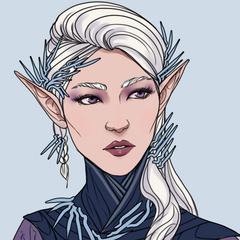 | |
| Languages | Sulvaley |
| Religion | Varied |
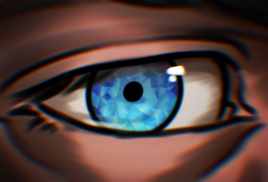
Dwellers of the high mountains and the wind-still valleys, the Isldar are a heritage of Elves. Once part of the collapsing Allorn Empire, the forerunners of the Isldar named Dregodar fled the heartland of their corrupt homeland to flee the murder of the Dragons. With their Dragon patrons leading them, the Dregodar fled far north, eventually settling in Ellador and creating a watchful state built on secrecy and isolation. War eventually came for them through the Dwarves and Velheim Ailor who the Allorn Elves manipulated to covet the Dregodar cities, which culminated in a string of disastrous wars. Beset by powerful Magical events, the Dregodar became the Isldar, wiping both their opposition and memory of their existence from the world. After a long period of isolation, Isldar society collapsed into a brutal civil war when dark secrets were revealed, only having become more of a cold war in recent times.
Design
The Isldar are identical to many of the other Elven heritages. While many of them have snow-white hair, this is by no means a requirement, as many Isldar also have black, brown, blonde, or red hair. The only true way to tell an Isldar apart from all other Elves is that their eyes no matter what their color is, have a pupil texture that appears like reflective shards of ice. Body-modding also occurs among the Isldar, though it tends to be more common in specific Factions. For example, the Evolvers combine their blood with Urlan and Wyvern genes, becoming a form of hybrid (see art on this page for inspiration), while those of the Pilgrims faction accept dragon scales and horns on their body to appear more Draconic. Finally, among the Truebloods, their skin is rarely turned blue or frost-like, with ice formations on their skin and hair to make them look permanently frozen but alive. Isldar are generally secretive, and secluded, with a frozen demeanor that hides a deep and sincere poetic culture. Though, Isldar have traveled all over the world, and it is just as possible for Isldar to have picked up habits from other people.
Factions
The Isldar civil war has ground to a halt. While officially there are still frontlines between the Draconism worshiping and the Evolism worshiping Isldar, these boundaries are fluid and are not hard-set. What this means is that Isldar society is rather fluid, since the end of the civil war, various factions that have no clear allegiance are present in both Vixit (Draconism Isldar) and Rexit (Evolism Isldar) societies, causing both societies to be split yet connected. Every Isldar is a member of a Faction, which dictates their life philosophy and role in the civil war. Note, Faction membership is not permanent, Isldar can change their allegiances based on world or personal events around them at any time. Most Factions are in a near-constant state of conflict, though some Factions have sensible agreements, for example, Menders and Frostlanders, and Pilgrims and Evolvers, who have secondary ideologies that agree with one another (conflict avoidance, faith, etc).
Stalwarts
The Stalwarts are a faction of Isldar present both among Vixit and Rexit, who prioritize what they consider the real threat for all Isldar: the Vampire Queendom of Dorkarth. The Stalwarts consider themselves above the civil war, want no further conflict between the two sides, and want instead to focus all efforts on combating the Vampires from the west, and other foreign incursions on Isldar soil. They directly oppose anyone who would work with the Afflicted or those who would limit the autonomy of the Isldar. In Regalia, Stalwarts work to send supplies and military expertise to the homeland.
Truebloods

The Truebloods are a faction of Isldar present both among Vixit and Rexit, who descend from the great Imperial houses of the Allorn Empire and have a long history of leading the Isldar people during their flight from the Allorn Empire. The Truebloods are traditionalists and autocrats, who believe the true enemy is not the Vampires to the west or the conflict among the Isldar, but the Allorn Empire. They remember the Cold March (their flight), and those who find themselves in Regalia agitate the Regalian Empire against the Allorn Empire, trying to turn the game of politics on their former enemy.
Menders

The Menders are a faction of Isldar present both among Vixit and Rexit, who initially took sides in the civil war, but eventually came to despise it for the destruction of the common history and culture it represented. The Menders primary objective is to create a lasting peace between the Rexit and Vixit, to find ways to reduce the friction between the two Religions and their cultural beliefs, and to repair Isldar society to what it once was after the Cold March. Menders in Regalia often act to expand their diplomatic repertoire, hoping to later turn social credit to the benefit of peace in their homeland.
Frostlanders
The Frostlanders are a faction of Isldar present both among Vixit and Rexit, who have rejected any form of conflict and more specifically the civil war on a fundamental level. The Frostlanders have abandoned the secretive mountain holds and dark fortresses to build settlements in collaboration with the Ailor colonists, Dwarven reclaimers, and peaceful Urlan who live on the land. The Frostlanders seek to show a better way than the constant running and fighting, by creating communities of multicultural acceptance and freedom. Those in Regalia have simply come there to express this sentiment in the most multicultural city.
Shrouded

The Shrouded are a faction of exclusively Rexit Evolism believers who veer close to being Death Cultists but reject the Death Gods outright. They have an obsession with the concept of death and are often the most beautiful and skilled dealers of it. The Shrouded meddle with Ordial powers, rejecting the authority of the Malefica, but trying to make bargains with the Consigner and Machinist to their benefit. The civil war is a means to an end, and they see a benefit in its resumption to provide them with the souls they need to bargain for power from the Death Gods. In Regalia, the Shrouded feel closest to their ambitions.
Icebloods

The Icebloods are a faction of exclusively Rexit Evolism believers who flirt with the powers of the Afflicted, and see the Dorkarthi Vampires as potential allies. The Icebloods either are or sympathize with Vampires and consider themselves to be the true inheritors of the crown of Ellador. The Icebloods have a strong power-based ideology where they reject the weak and recruit the strong. They insist the civil war must restart so that they can cleanse the weak both from Vixit and Rexit society, and force the rest to see their ways. In Regalia, the Icebloods seek allies among the Vampires and undermine the other factions.
Pilgrims

The Pilgrims are a faction of exclusively Vixit Draconism believers who hold onto strong principles of piety and virtue in the eyes of Draconism, and preach the original dogma of isolated watching of the world's events without interfering. The Pilgrims established great houses of prayer and traveled the land administering religious services. To them, the civil war is a necessary evil, to cleanse Ellador of the corruption brought by the Rexit and their betrayal of the Dragon Gods, though they often do not do the fighting themselves, instead coming to Regalia to recruit other Draconists of other cultures and societies.
Evolvers

The Evolvers are a faction of exclusively Vixit Draconism believers who believe that the flaws of the civil war and Isldar society at large were caused by the inherited Elven heritage. To them, the Isldar are a people out of place and out of time, and the key to adapting to their new environment and world is right there in Draconic wisdom. They use Magic to unlock the secrets of Wyverns and Urlan, becoming Elf-Wyvern-Urlan hybrids of sorts. They favor starting up the civil war as quickly as possible, showcasing their evolved superiority to remove the blemish of the Void Gods from the pristineness of the Dragons's Craters of Creation. Not all Evolvers are genetically modified, some of them are just standard Isldar who just support the movement. Additionally, the appearance of Evolver Faction Isldar is not unique to the faction, Evolvers can have swapped to a different faction, but retained their genetic modifications.
Heritage Traits
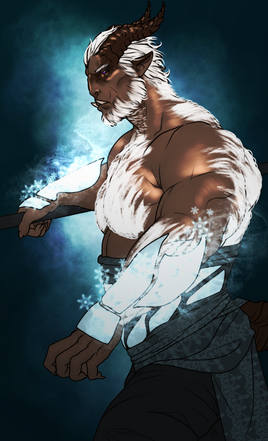
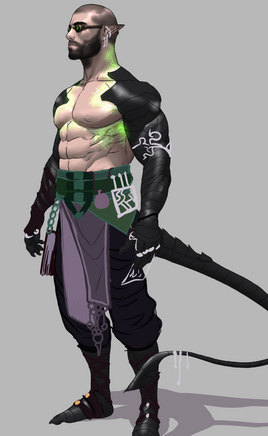
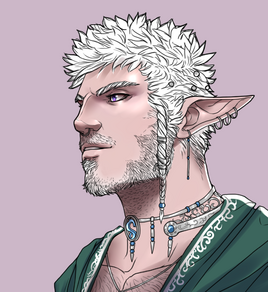
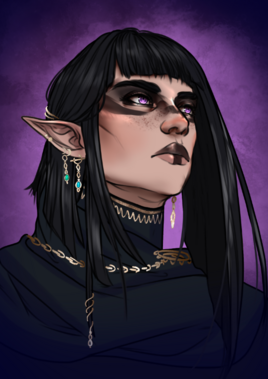
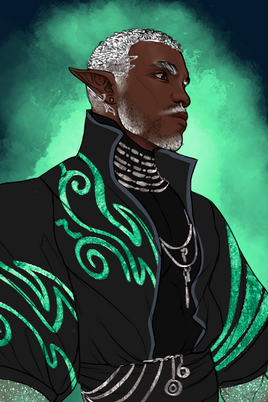
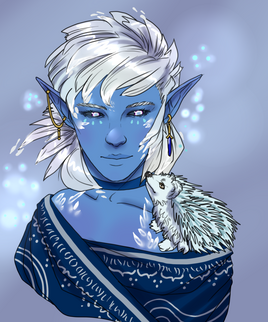
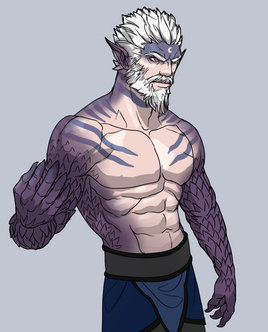
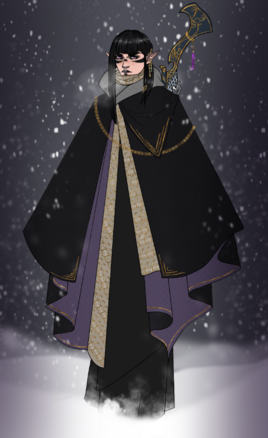
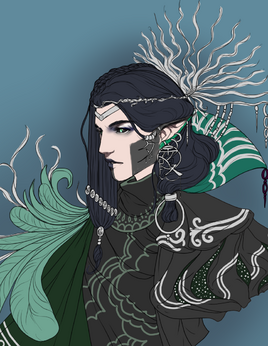
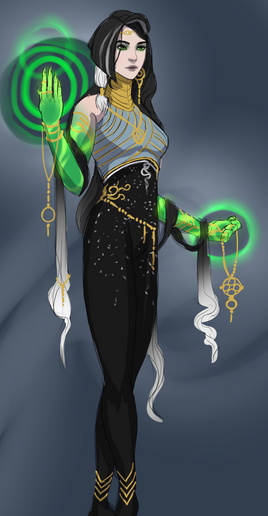
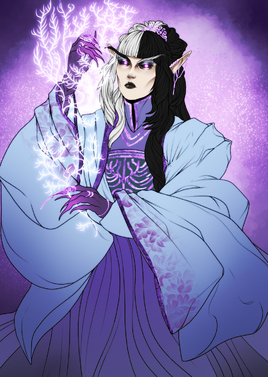
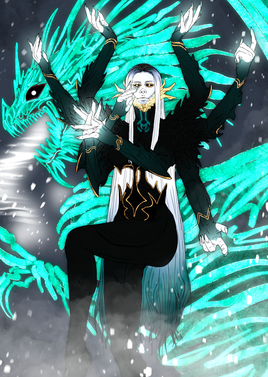
In Character Design, Proficiency allows for the buying of Packs, which give Combat Abilities. Heritage Traits add free Packs and Mechanics to a Character, fit around cultural themes. Mechanics are flair and roleplay opportunities Characters have outside of Combat, while Packs are Combat Power. Free Magic Packs can always be defined as any Alignment.
Free Packs
- Isldar can choose one Athletic or Magic Pack for free.
- Isldar can choose one pack from Roguery Point Buy for free.
Mechanics
- Isldar are natural-born Arctic survivalists who have spent centuries adapting to the cold of Ellador. Not only are they immune to the harm from frost or cold sources, but they do not suffer loss of vision or orientation during a blizzard or weather conditions. Isldar are not affected by Magical Weather Area Effects. Isldar can sing frost into the water, causing ice crystals to form that do not melt when exposed to heat.
- Isldar hold power over the passage of life and death. If they are near a person who is about to die, they can either ensure that the soul passes into the afterlife and is not stolen by other entities or prevent it from even detaching from their body, thus turning that person into an Undead forcibly (keep in mind, doing either has moral weight and is judged by Religions). Additionally, Isldar can see the Soul Rivers, the natural pathways souls take to reach the afterlife, and can tell if a person has died if they know their true name.
- Isldar who follow the Evolist Religion can use a Monster Transformation that turns them into a monster of flesh and bone that counts as a Disguise (but is an Evolism worshiping Isldar). Isldar who do not follow the Evolism Religion can put security incantations and prayers on their homes, making them naturally impervious from being spied upon, or broken into. With the OOC consent of other players, they can also use spy equipment to discover what is happening in their Rental Regions.
- Isldar have natural suppressants in their own mind against interference and meddling from the outside. Even with OOC consent given, Isldar minds have stronger protection against any form of Mind Control. Their emotions are also not readable by those who can read and change emotions, unless they specifically let their mind be entered. Finally, Isldar minds also hold strong protections against the prying of Spirits. While they are not immune to a Spirit's influence, Spirits cannot easily detect their vices and ambitions to seduce them.
- Starting Combat in a cold weather environment (with blocks of snow or ice present), Isldar gain +2 Attack Stat (breaking Cap up to 11) for every Attack Emote. This is limited to mountainous regions and Magical Ice Area Effects, but when the snow has blanketed Regalia during winter, this applies to the whole map for a 1-and-a-half-month period between November 15th and January 1st, but the bonus is halved to 1 instead of 2.
Evolver Traits
Evolvers Faction Isldar are biologically slightly different from standard Isldar, so much so that they could be considered a sub-group. Being Elf-Wyvern-Urlan hybrids, Evolver Isldar have their own set of Mechanics outlined below. This only applies to Evolver Faction Isldar who have also physically changed, as it is also possible to play an Evolver Isldar who has not yet (or won't) taken on physical body-modding.
- Evolver Faction Isldar who have been genetically altered, receive Mechanics 1, and 2 from the Isldar Heritage Mechanics.
- Evolver Faction Isldar who have been genetically altered, receive Mechanics 1, 2, and 5 from the Urlan Heritage Mechanics.
- Evolver Faction Isldar who have been genetically altered may exchange their free Roguery Point Buy Pack for a Training Point Buy Pack.
Language and Naming
Isldar speak an Elven language called Sulvaley, which descends from the common Elven tongue but has heavily diverged. This is because the Isldar have been influenced over the centuries by Daranet, the incomprehensible tongue of Dragons, which has contributed many loanwords. An Isldar who speaks 'pure' Sulvaley can be roughly understood by other Elven speakers if they are familiar with grammar shifts, but 'common' Sulvaley is so Draconically warped that it becomes impossible. Though they are still Elves, the accent of the Isldar gives them an almost Arabic feeling when they talk in Common.
- Example Male Isldar Names: Asrel, Henqaan, Nayaal, Novyaan, Anshaar, Ravlan, Marcaror, Sonraal, Narvael, Alrifar.
- Example Female Isldar Names: Samala, Isavaila, Saaliya, Silyana, Fismeya, Savraela, Veana, Naerassa, Eyfa.
- Example Unisex Isldar Names: Sil, Aleyras, Asir, Esmeya, Asamey, Manyaar, Qiaan, Feynral, Savaa, Qirnar.
Religions
The vast majority of Isldar are either Draconism worshipers or Evolism worshipers, with a clear split of Vixit and Rexit respectively. The Religion section provides explanations for how any Isldar could worship other Religions, though these two Religions are so core to their history and playstyle, that it is recommended to retain one of these two Religions.
- Draconism: Draconism is the original Religion of the Isldar back from when they were Dregodar. The Dregodar accepted the faith of the Dragons when the waning Allorn Empire became rife with corruption, believing that Dracon creationism was the answer to the Empire's woes. Modern Vixit Isldar still hold to Draconism, taking particular patronage of Aurora and more recently Regulus.
- Evolism: Evolism is a relative newcomer for the Isldar, but a natural conclusion after the revelation, that their society had been controlled by the Death Goddess Ravaal since they had become Isldar. In Evolism, the Rexit Isldar take particular patronage of Ravaal and her undead Dragon Frisit, who they in the past mistakenly thought was Aurora.
- Unionism: Some Isldar in the Regalian Empire have converted to Unionism, especially after they have abandoned the conflict in Ellador.
- Fornoss: Some Isldar both in the homeland and Regalian Empire have converted to Fornoss, due to their alliance and proximity with Velheim Ailor.
- Estelley: Estelley is a strange Religion to follow for Isldar, as it is the faith of their persecutors. Not many do, with no real logic.
- Khama: Some Frostlanders have gotten close to Asha who live in Ellador, resulting in a small smidgen of Khama converts.
- Nilthism: Nilthists are present in all societies, as the visions come and go, and are received by all heritages.
- Minor Faiths: Most Minor faiths are far removed from Isldar, what with the oceans being frozen, and no proximity to the Primevals.
Brief History
Isldar history started several thousand years ago in the waning Allorn Empire, which was collapsing slowly under its own weight and corruption. Through the influence of the Demons and Dark Gods, Allorn society became seduced by murderous magics and cruel customs. The Dregodar formed a cult around the Dragons, believing their stewardship of the natural world to be the answer to the corruption that plagued the Allorn Empire. They then attempted to either convert the princes or secretly steer the Allorn Empire back to stability through the teachings of Dragons and Dragon Magic. Ultimately, they failed and caught the ire of the same Allorn princes they tried to convert, who declared them interlopers and hunted them down. This is where the Cold March began, and they continued ever northward.
The Dregodar met many people along the way, some who offered them shelter, others who collaborated with the Allorn. Battles ensued that whittled down their numbers, and even Dragons fell over the century or so it took them to flee ever north. Eventually, they found themselves in Ellador, which was sufficiently removed from the Allorn Empire not to draw attention, or so the Dregodar thought. While the Dregodar built their crystal palaces high up in the mountains, Allorn saboteurs influenced the Dwarven underground Empire, and the Velheim Ailor settlers on the coast to covet the lands the Dregodar had settled. They convinced them that the Dregodar were planning to eradicate the Dwarves and Ailor and take all the lands for themselves, despite the Dregodar's best efforts to share the land with the native populations.
This eventually culminated in a series of disastrous wars that led to massive casualties on all sides and ended with the Dregodar inflicting a pyrrhic victory on the Ailor and Dwarves. The Dwarven Empire would soon collapse with the majority of their population being decimated by the Dakkar who rose up from the deep tunnels under their underground cities, weakened from the war with the Dregodar. The Ailor in turn would be pushed to the brink of being expelled from Ellador altogether in the ensuing Vampire Wars after the Cataclysm, also weakened by a century of war with the Dregodar. The Dregodar themselves were affected by powerful Magics when the Dragon Aurora sacrificed herself to end the war, becoming the Undead Dragon Frisit who would continue to lead their people for the next 400 years. The continent of Ellador became frozen over by the Dragon's death and has remained arctic ever since.
After the Cataclysm, most of the world forgot about the Isldar, who were content to be isolated from it and only affect key events that were to their interests. Isldar society was slowly molded into a distrusting and vengeful people that would not tolerate any outsiders, leading to stories of ghosts in the snow that would kill anyone trespassing on their territory. When the Dragons returned, it was revealed that the Dragon Frisit was an Ordial Entity under the control of the Death Goddess Ravaal instead, unmasked by the Dragons. This caused an immediate civil war between those who wanted to return to the dogma of the Dregodar and those who descended into full worship of their now Evolist Goddess Ravaal. The civil war ended recently due to the intervention of the Regalian Empire and the large migration of Urlan into the territory, forcing both Rexit and Vixit into an uneasy truce while they fortified their borders with each other and the Dorkarthi Vampires to the west. Over time, factions formed in both societies, that started creating memberships in both societies, causing their people to re-connect with one another through these memberships.
Expanded Lore
Expanded Lore exists to apply more content and deep-lore exploration. This section is optional reading that is not required for a good experience, but if you play a scholar of some kind, it's encouraged to read this information.
Detailed Evolver Description
While art exists on this page to explain what Evolvers who use genetic manipulation looks like, this single image cannot wholly capture the full variances. For purposes of clarity, the design will be referred to as Evolver, even though this appearance is not unique to Evolver Faction Isldar, nor applied to all Evolver Faction Isldar, it is just easier when referring to it as a single word. Evolvers appear like Elf-Wyvern-Urlan hybrid, meaning their body has aspects of all three present (but never wings). Evolvers can have scales, or fur, or both. Their head is never quite fully lizard-like or furred animal-like, but somewhere in between more humanoid and beastly with for example an exaggerated nose bridge and mouth with tusks that appear more animalistic. They can have full body fur cover save for the face, parts of it, or just aggressive body hair, or none. They can have tails, digitigrade legs, cloven hooves or dragon-claws, and horns either like antlers or a Dragon's horns. Some of the aesthetics may evoke yeti's or frost trolls, as most Evolvers tend to be on the brawny side. Evolvers have come about through Magical manipulation of the Creation Particles, a very complex and barely understood type of Dragon Magic that genetically adapts a body to different environments. These Evolver Faction Isldar created this genetic mixture by reverse engineering the Symbiosis effects of the Oorl worm, and the Wyvern as an animal. Needless to say, Urlan may not look kindly on the historical experimentation on Oorl worms, even if there is a form of kinship with the Evolvers.
Clothing
Isldar fashion is more pragmatic than most Elven styles, made for Ellador's sub-zero environment. It tends to mix a combination of tighter, simpler underclothes with traditional Elven robes that can be quickly shed if a fight breaks out. While the Isldar still wear embroidery and jewelry, they are considered more on the austere side, with muted dulled colors. Isldar inside wear and underclothes tend to be darker and more vivid, while the opposite is true of their cloaks and shrouds, which are overwhelmingly plain, designed with the empty white tundra of Ellador in mind. Moon symbolism is very common with the Isldar because the pale moon was one of the first emblems of the Cult of Dregodar back in the Allorn days, but the Evolists have mostly discarded this and other traditional Elven symbolism for a macabre focus on bone motifs. Dark skeletal mock armor, black metal plates arranged like scales, giant nails and elaborate headdresses: the Evolist fanatics have a head for the ostentatious and sleek, dressing to draw eyes from every room they walk into. Most Isldar, though, have a persistent sort of "ranger" look about them due to their origin as soldiers across many lifetimes. With belts for field equipment and hidden knives, even their upper class, such as it is, looks ready for a week lost in the snow-covered wilderness. There are a few unique Isldar fabrics, such as Starshimmer fabric that looks like a thin translucent dark purple gauze with white star speckles across its surface, that are quite prized and hard to get in Regalia. Additionally, Isldar are skillful tattoo artists: many show religious devotion, while some others are just stylistic. Most Isldar, at least, have Magical glyphs tattooed at the base of their necks in honor of their patron Gods, that are supposed to ward away the eyes of those who would want to harm them.
Families and Romance
Family is incredibly important to the Isldar, whose broader society remains somewhat tribal, strung together by clans. When living in a place as large and inhospitable as Ellador, clans become an easy way to establish relations with someone else: with each clan usually having a trade, a social standing, and a vague place of origin, just learning a name can communicate a lot of information. Unlike the other Elven peoples who keep very small and slow to grow families, Isldar often have many siblings, first cousins, and even more second cousins. While there is not a pre-written list of Isldar families or great clans, it is encouraged for players to think about their Characters' and use them for easy backstory ties with one another. While some Isldar families and traditional clan bonds were destroyed by the religious schism, the more powerful or stable clans were mostly able to stick together. A situation where an entire great clan of thousands of people fought on the same side and a situation where a family of four split halfway down the middle are equally possible, depending on the desired story. The Isldar have a very deep but slightly prudish culture around romance. While they are not as conservative as the Lanlath, for example, the usual ideal demands long sheafs of sappy poetry penned in the honor of one's lover. Another common cultural theme is to sacrifice for love: there are many heroes in the Isldar poems and epics, who were forced to lay down their lives for a spouse or forbidden lover, immortalized after death. Needless to say, the Isldar make for very passionate partners under their frigid, emotionless exteriors, if one is able to survive their love for the dramatic and the occasional moonlight saber duel fought with a competitor for a darling's hand.
Art
The Isldar are famous for two forms of visual art: calligraphy, and wall carvings. Their intricate and alien etched designs laid into the permafrost of the deepest Hold interiors can spiral up around the viewer for so high and long that they cannot see the end of them from the ground. Isldar wall carvings are usually renditions of the poetic epics to put them into memory, or more relevantly, religious texts. Many of the countryside Isldar built their crystal towers of observation atop old obelisks and hidden chambers of the gospel of Dragons from the Allorn day. Though some have been destroyed, most yet remain. Isldar calligraphy is prized mostly because of their unique flowing script. While still decidedly Elven, other Elves like to use it in artwork from time to time to make text illegible to the common eye or evoke the distant air of snowy Ellador, while non-Elven cultures see beauty in the twisting, looping shapes, much the same. Otherwise, their poetry and choral song are prized for their intensity, especially the romances. Isldar poetry is often very tragic, dreary, and emotionally heavy: they believe that an honest story must include lows as deep as the highs are tall. Even the Isldar Song of Life and Song of Death, the magical cants that pass the dead on or damn them to Undeath, have been described as a love song to a life and a hate song to a death respectively, begging the listener in swirling verse to accept the beauty of the time they have had, or rage against what was taken from them.
Other Cultural Habits
- Ordial Magic is not exclusive to Evolism Isldar, and Dragon Magic is not exclusive to Draconism worshipers. Magic Alignment can exist across religions, because Draconism allows the existence of Ordial Magic that is not strictly tied to the Death Gods, and Evolism has no strong anti-Draconist lean.
- There are two important figures in Isldar history from the Cold March. Empress Vinnalea, the Allorn Empress who presided over chasing and attacking them, and Prince Varendracar, her cousin who converted to Draconism and sided with the Dregodar. Vinnalea is routinely cursed and her memory spat on, which causes friction with other Elves who remember her as a glorious, capable ruler, and Varendracar is praised as a noble hero, since he died in battle alongside the Dragon Gaia around halfway through the March in a heavy pitched battle.
- Isldar cannot stand spicy food, but they have the inverse: very, very strong minty substances that can get so strong as to numb the mouths of those without appropriate tolerance. A common Isldar response to being made fun of for not being able to handle a pepper is offering the offender a sprig of Ellador Blizzardmint.
- Isldar have a very strong tea culture. It is a critical element of any and all Isldar hospitality to offer a guest some tea. Some Isldar even barter with tea bricks. Most famous of all is their black tea steeped for a very long time to be incredibly strong, and then muddled with butter from Ellador mountain yaks, so that it has a buttery and warming feeling to it.
- Isldar alcohol is very sweet and fruity, with bright peach and pear and apple notes. They drink it in shots served in engraved steel cups inlaid with silver. Sometimes Isldar alcohol is flavored with the mint mentioned in the previous bullet point, which gives it a chilling kick in the back of the throat.
- Isldar are Wyvern riders, and fancied to be the best in Aloria. Even though they are excellent riders who form lifetime bonds with their mounts, there is an Isldar saying that "only a southlander would fly a wyvern for everyone to see." Just like one can be ambushed on the land, one can also be ambushed in the sky by those who take offense to one's presence.
- Isldar are not just singers. They also have a long tradition of harp and lyre music, and very deep, wistful flutes carved from the reeds that used to grow on the banks of southern Ellador before it froze over. All the same, it is their choirs that remain the most famous both at home and abroad, usually as a medium for their poetic tradition.
- Isldar enjoy accuracy-based sports like rifle, archery, javelin, and dart competitions with the best shot being rewarded. These take precedence over any kind of organized team sports. On the intellectual side, they are also fond of symposiums, debates, and other kinds of verbal sparring. Anything with a duel theme is bound to be popular.
- Isldar have a very strong concept of guest right and hospitality. If one is enemies with an Isldar, the safest place to be is at their doorstep begging sanctuary. The most common way guest right is given is by offering a glass of ice water. If an Isldar offers one among five captives a drink, then that one should breathe easy, and the other four should start sweating.
- Isldar prize their ornamented, inscribed dueling sabers, which are passed down their family line as an object of honor and dignity. These swords are only intended to be ceremonially used for honor duels, and are so richly decorated that they would not long survive the beating that a tour of use on the battlefield would mark on them.
- Isldar camping and woodcutting blades are short, curved forward at the tip (refer to real-life Nepalese khukuri). In a pinch, it can be a useful sidearm.
- Isldar are one of the cultures of Aloria that sometimes uses gunpowder weapons. They have no native gunpowder artillery, or sidearms like pistols, but make very long metal-banded rifles they call 'jazalya,' for sniping into valleys.
- Isldar do not see honor in standing and fighting. They are relentless ambush warriors who attack their enemies unseen, cover them in a hail of javelin fire, dive in with their moon-glaives, and then turn around and escape back onto their Wyverns and leave. The Isldar saying on this goes, "the men who call you cowards will die."
- Isldar love hunting and wilderness pursuits. They are stealthy and silent hunters, the calculated and chilling opposite of the nature-attuned Urlan. If Isldar and Urlan are hunting together, it is doom for their target.
- Isldar also love parkour and roof climbing and running in urban settings. Rooftops also make space to sit privately and talk about personal feelings without a looming crowd, making them an Isldar favorite.
- Isldar are very adept observers and astronomers, especially with their brilliant eyesight. Their Crystal Spire observatories hidden around Aloria also double as places to chart the stars.
- Isldar are fond of moon and lunar symbolism. In the early days, the Dragon Worshipers disguised themselves as worshipers of Leyon by using a slightly different moon, and this stuck.
Trivia
- The Isldar are very fond of elaborate board games, and have a good knowledge of different internationally famous ones, especially chess.
- The elaborate acrobatic games of the Isldar, like throwing darts and backflipping, have achieved some renown around the world as evidence of the unrivaled dexterity of these mysterious Snow Elves.
- Isldar could do to smile a little more, but none of them ever will.
| ||||||||||||||||||||||||||
| Accreditation | |||||||
|---|---|---|---|---|---|---|---|
|
| ||||||